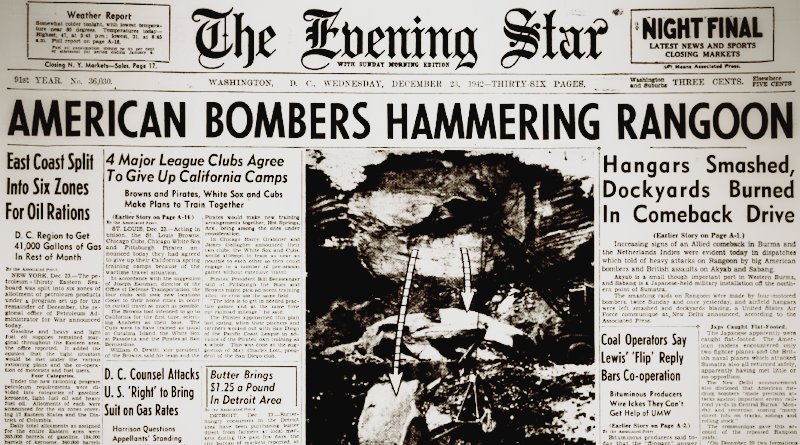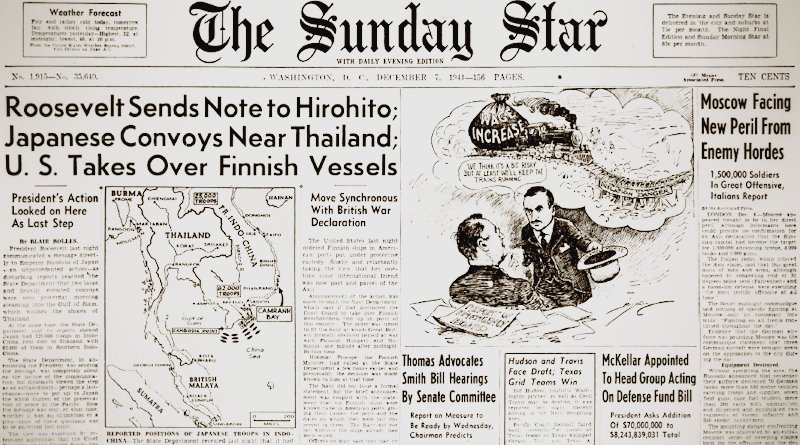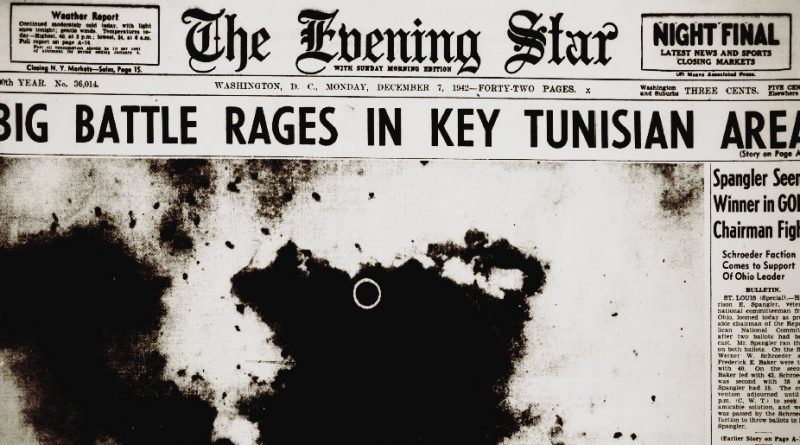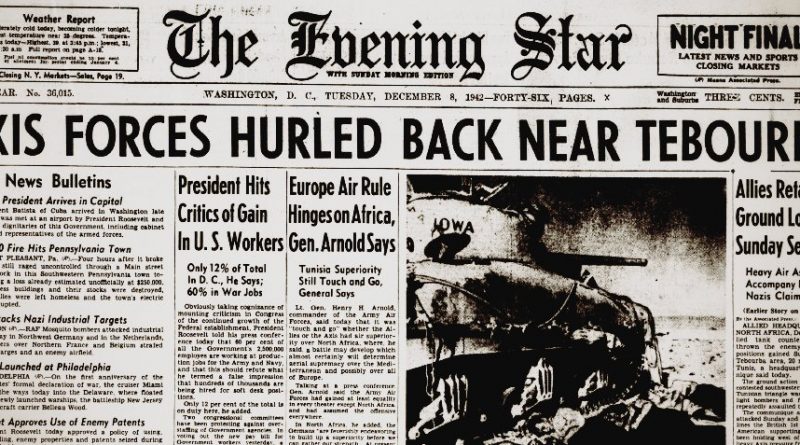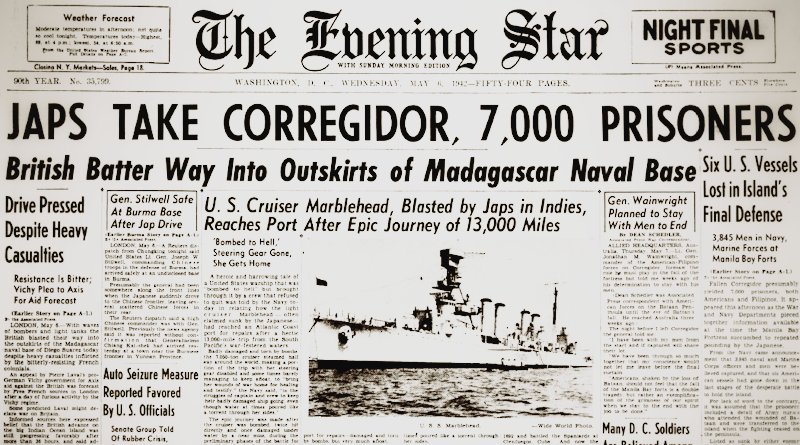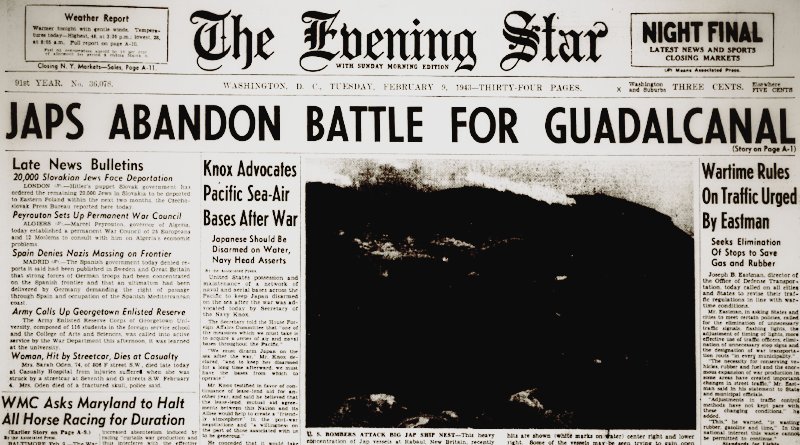World War II Chronicle: December 24, 1942
Click here for TODAY’S NEWSPAPER
Page 11 reports that 2nd Lt. Kenneth D. Frazier, a Marine Corps double-ace with 11.5 kills, was nearly gunned down after bailing out of his crippled fighter by an enemy pilot. As the Zero turned around to finish the parachuting Frazier off, the Zero was blasted out of the sky by a fellow Marine…
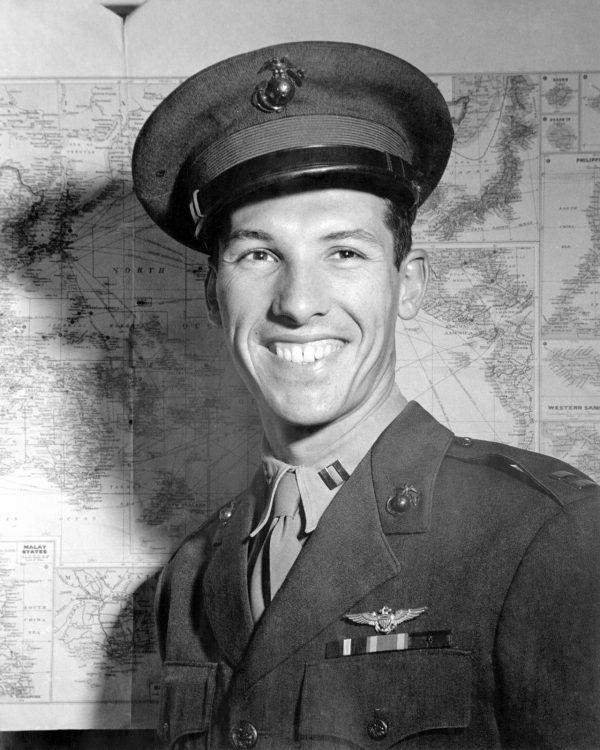
Sports page begins on page 23…
Roving Reporter by Ernie Pyle
WITH THE AMERICAN FORCES IN ALGERIA — I had often wondered in just what sort of formation a big convoy moved, and whether you could see the whole thing all the time or not, and how the escort vessels acted.
Well ours was a medium big convoy. The day we left, we counted a certain maximum number of ships. We were never able to count the same number again until we got almost to port. Not because they were out of eye-range, but because they were lined up in rows and you couldn’t see those behind other ships. Usually our convoy was wider than it was long, which surprised me.
The convoy seemed to used three of four different geometric patterns. Every little bit the entire formation would change from one pattern to another, like a football team shifting after a huddle. It was fascinating to watch some ships speed up, others dropped back, and the new pattern take shape.
In addition the entire convoy, moving in unison, zigzagged constantly. The turns were sudden, and so sharp that the ships would heel over. These zigzags made at frequent intervals — very frequent when we were in suspicious waters.
British corvettes and warships were ahead and on all sides of us. They didn’t do much dashing about, but seemed to keep their positions just as steadily as we did ours.
In the daytime we ran half a mile or so apart, and at night the entire convoy tightened up. At night you could distinguish two or three dark shapes close around us. I do not know whether it was true, but they said we had additional escorts out of sight over the horizon.
So far as we know, there was only one “incident” during the entire trip. We were on the outside of the convoy. The corvette on out beyond us, and the transport running aft of us, bot signaled that a torpedo had passed just behind us and just ahead of the other transport.
The corvettes dashed around and dropped depth charges. That was all there was to it. Nobody on our ship saw the torpedo, and nobody at all saw the submarine.As we progressed southward, the weather became absolutely heavenly — softly warm and so calm there was no movement whatever in the ship. Many soldiers slept on deck those last few nights. Often it seemed like a peacetime tropical cruise, instead of a packed trooper going dangerously to war.
The last three nights we were ordered to sleep in our clothes. It would be wrong to deny that people were tense those days, but it also would be wrong to say that fear was shown by anybody.
Dawn and dusk were the crucial times and the last two mornings I managed to get awake and on deck just before daylight. I never saw any submarines, but I saw two of the most thrilling sunrises I’ve ever known.
As we drew closer and closer to journey’s end, we acquired a feeling something akin to family love for our team of ships. We had come so far together, had so perfectly consummated our endless shifting of formation, and eternal zigzagging.
We somehow became like an enormous oceanic machine, engaged in a giant rhythmic rotation, our ability to go on and on forever insured by the perfection of our own discipline.
The sight of us, above all the sights of wartime that I’ve ever seen, thrust itself into my memory forever. Hour after hour I stood at our rail looking out over that armada of marching ships — they did really seem to march across the ocean — and an almost choking sense of its beauty and power enveloped me.At last we came to the Straits of Gibraltar — to lights on both sides of us — and then on into the calmness of the Mediterranean. We still sailed a long time, still in dangerous waters, but a pleasant relief took hold of us.
We started to pack. We were issued our desert gear of dust masks, water purifiers and so on. We tipped our stewards. We returned borrowed books. We trade our money for the new American issue. We took down outfit numbers for looking up new Army friends.
Finally we arrived, slowly and intricately, like twine from a hidden ball, the ships poured us out onto the docks in long brown lines. We lined up and marched away.
Some of us marched three miles, some of us 20 miles. We marched at first gaily and finally with great weariness, but always with a feeling that at last we were beginning the final series of marches that would lead us home again — home, the one really profound goal that obsesses every one of the brown-clad American marching today on foreign shores.
Evening star. (Washington, D.C.), 24 December 1942. Chronicling America: Historic American Newspapers. Lib. of Congress.
https://chroniclingamerica.loc.gov/lccn/sn83045462/1942-12-24/ed-1/
